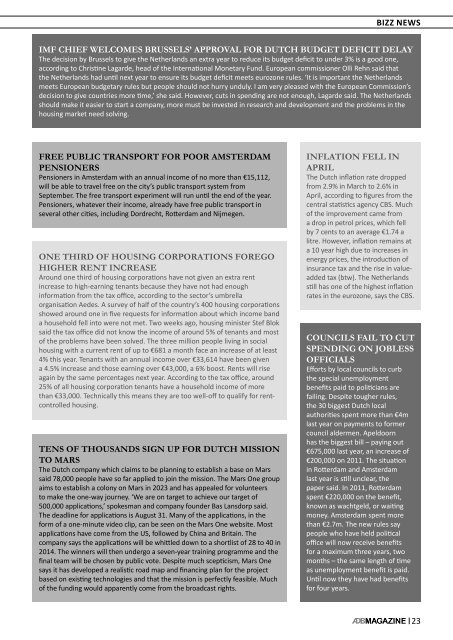June - July 2013 - Association of Dutch Businessmen
June - July 2013 - Association of Dutch Businessmen
June - July 2013 - Association of Dutch Businessmen
Create successful ePaper yourself
Turn your PDF publications into a flip-book with our unique Google optimized e-Paper software.
Bizz News<br />
IMF chief welcomes Brussels’ approval for <strong>Dutch</strong> budget deficit delay<br />
The decision by Brussels to give the Netherlands an extra year to reduce its budget deficit to under 3% is a good one,<br />
according to Christine Lagarde, head <strong>of</strong> the International Monetary Fund. European commissioner Olli Rehn said that<br />
the Netherlands had until next year to ensure its budget deficit meets eurozone rules. ‘It is important the Netherlands<br />
meets European budgetary rules but people should not hurry unduly. I am very pleased with the European Commission’s<br />
decision to give countries more time,’ she said. However, cuts in spending are not enough, Lagarde said. The Netherlands<br />
should make it easier to start a company, more must be invested in research and development and the problems in the<br />
housing market need solving.<br />
Free public transport for poor Amsterdam<br />
pensioners<br />
Pensioners in Amsterdam with an annual income <strong>of</strong> no more than €15,112,<br />
will be able to travel free on the city’s public transport system from<br />
September. The free transport experiment will run until the end <strong>of</strong> the year.<br />
Pensioners, whatever their income, already have free public transport in<br />
several other cities, including Dordrecht, Rotterdam and Nijmegen.<br />
One third <strong>of</strong> housing corporations forego<br />
higher rent increase<br />
Around one third <strong>of</strong> housing corporations have not given an extra rent<br />
increase to high-earning tenants because they have not had enough<br />
information from the tax <strong>of</strong>fice, according to the sector’s umbrella<br />
organisation Aedes. A survey <strong>of</strong> half <strong>of</strong> the country’s 400 housing corporations<br />
showed around one in five requests for information about which income band<br />
a household fell into were not met. Two weeks ago, housing minister Stef Blok<br />
said the tax <strong>of</strong>fice did not know the income <strong>of</strong> around 5% <strong>of</strong> tenants and most<br />
<strong>of</strong> the problems have been solved. The three million people living in social<br />
housing with a current rent <strong>of</strong> up to €681 a month face an increase <strong>of</strong> at least<br />
4% this year. Tenants with an annual income over €33,614 have been given<br />
a 4.5% increase and those earning over €43,000, a 6% boost. Rents will rise<br />
again by the same percentages next year. According to the tax <strong>of</strong>fice, around<br />
25% <strong>of</strong> all housing corporation tenants have a household income <strong>of</strong> more<br />
than €33,000. Technically this means they are too well-<strong>of</strong>f to qualify for rentcontrolled<br />
housing.<br />
Tens <strong>of</strong> thousands sign up for <strong>Dutch</strong> mission<br />
to Mars<br />
The <strong>Dutch</strong> company which claims to be planning to establish a base on Mars<br />
said 78,000 people have so far applied to join the mission. The Mars One group<br />
aims to establish a colony on Mars in 2023 and has appealed for volunteers<br />
to make the one-way journey. ‘We are on target to achieve our target <strong>of</strong><br />
500,000 applications,’ spokesman and company founder Bas Lansdorp said.<br />
The deadline for applications is August 31. Many <strong>of</strong> the applications, in the<br />
form <strong>of</strong> a one-minute video clip, can be seen on the Mars One website. Most<br />
applications have come from the US, followed by China and Britain. The<br />
company says the applications will be whittled down to a shortlist <strong>of</strong> 28 to 40 in<br />
2014. The winners will then undergo a seven-year training programme and the<br />
final team will be chosen by public vote. Despite much scepticism, Mars One<br />
says it has developed a realistic road map and financing plan for the project<br />
based on existing technologies and that the mission is perfectly feasible. Much<br />
<strong>of</strong> the funding would apparently come from the broadcast rights.<br />
Inflation fell in<br />
April<br />
The <strong>Dutch</strong> inflation rate dropped<br />
from 2.9% in March to 2.6% in<br />
April, according to figures from the<br />
central statistics agency CBS. Much<br />
<strong>of</strong> the improvement came from<br />
a drop in petrol prices, which fell<br />
by 7 cents to an average €1.74 a<br />
litre. However, inflation remains at<br />
a 10 year high due to increases in<br />
energy prices, the introduction <strong>of</strong><br />
insurance tax and the rise in valueadded<br />
tax (btw). The Netherlands<br />
still has one <strong>of</strong> the highest inflation<br />
rates in the eurozone, says the CBS.<br />
Councils fail to cut<br />
spending on jobless<br />
<strong>of</strong>ficials<br />
Efforts by local councils to curb<br />
the special unemployment<br />
benefits paid to politicians are<br />
failing. Despite tougher rules,<br />
the 30 biggest <strong>Dutch</strong> local<br />
authorities spent more than €4m<br />
last year on payments to former<br />
council aldermen. Apeldoorn<br />
has the biggest bill – paying out<br />
€675,000 last year, an increase <strong>of</strong><br />
€200,000 on 2011. The situation<br />
in Rotterdam and Amsterdam<br />
last year is still unclear, the<br />
paper said. In 2011, Rotterdam<br />
spent €220,000 on the benefit,<br />
known as wachtgeld, or waiting<br />
money. Amsterdam spent more<br />
than €2.7m. The new rules say<br />
people who have held political<br />
<strong>of</strong>fice will now receive benefits<br />
for a maximum three years, two<br />
months – the same length <strong>of</strong> time<br />
as unemployment benefit is paid.<br />
Until now they have had benefits<br />
for four years.<br />
23















